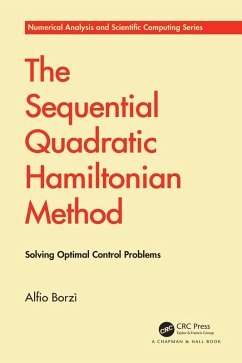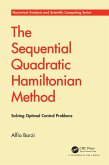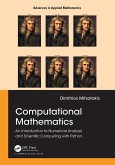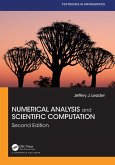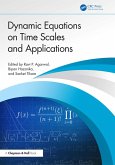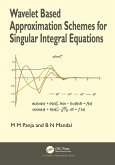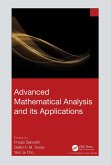Alfio Borzì
The Sequential Quadratic Hamiltonian Method (eBook, ePUB)
Solving Optimal Control Problems
173,95 €
173,95 €
inkl. MwSt.
Sofort per Download lieferbar

87 °P sammeln
173,95 €
Als Download kaufen

173,95 €
inkl. MwSt.
Sofort per Download lieferbar

87 °P sammeln
Jetzt verschenken
Alle Infos zum eBook verschenken
173,95 €
inkl. MwSt.
Sofort per Download lieferbar
Alle Infos zum eBook verschenken

87 °P sammeln
Alfio Borzì
The Sequential Quadratic Hamiltonian Method (eBook, ePUB)
Solving Optimal Control Problems
- Format: ePub
- Merkliste
- Auf die Merkliste
- Bewerten Bewerten
- Teilen
- Produkt teilen
- Produkterinnerung
- Produkterinnerung

Bitte loggen Sie sich zunächst in Ihr Kundenkonto ein oder registrieren Sie sich bei
bücher.de, um das eBook-Abo tolino select nutzen zu können.
Hier können Sie sich einloggen
Hier können Sie sich einloggen
Sie sind bereits eingeloggt. Klicken Sie auf 2. tolino select Abo, um fortzufahren.

Bitte loggen Sie sich zunächst in Ihr Kundenkonto ein oder registrieren Sie sich bei bücher.de, um das eBook-Abo tolino select nutzen zu können.
The SQH method is a powerful computational methodology that is capable of development in many directions. This book discusses its analysis and use in solving nonsmooth ODE control problems, relaxed ODE control problems, stochastic control problems, mixed-integer control problems, PDE control problems, and more.
- Geräte: eReader
- mit Kopierschutz
- eBook Hilfe
Andere Kunden interessierten sich auch für
![The Sequential Quadratic Hamiltonian Method (eBook, PDF) The Sequential Quadratic Hamiltonian Method (eBook, PDF)]() Alfio BorzìThe Sequential Quadratic Hamiltonian Method (eBook, PDF)173,95 €
Alfio BorzìThe Sequential Quadratic Hamiltonian Method (eBook, PDF)173,95 €![Computational Mathematics (eBook, ePUB) Computational Mathematics (eBook, ePUB)]() Dimitrios MitsotakisComputational Mathematics (eBook, ePUB)115,95 €
Dimitrios MitsotakisComputational Mathematics (eBook, ePUB)115,95 €![Numerical Analysis and Scientific Computation (eBook, ePUB) Numerical Analysis and Scientific Computation (eBook, ePUB)]() Jeffery J. LeaderNumerical Analysis and Scientific Computation (eBook, ePUB)60,95 €
Jeffery J. LeaderNumerical Analysis and Scientific Computation (eBook, ePUB)60,95 €![Dynamic Equations on Time Scales and Applications (eBook, ePUB) Dynamic Equations on Time Scales and Applications (eBook, ePUB)]() Dynamic Equations on Time Scales and Applications (eBook, ePUB)52,95 €
Dynamic Equations on Time Scales and Applications (eBook, ePUB)52,95 €![Wavelet Based Approximation Schemes for Singular Integral Equations (eBook, ePUB) Wavelet Based Approximation Schemes for Singular Integral Equations (eBook, ePUB)]() Madan Mohan PanjaWavelet Based Approximation Schemes for Singular Integral Equations (eBook, ePUB)64,95 €
Madan Mohan PanjaWavelet Based Approximation Schemes for Singular Integral Equations (eBook, ePUB)64,95 €![Advanced Mathematical Analysis and its Applications (eBook, ePUB) Advanced Mathematical Analysis and its Applications (eBook, ePUB)]() Advanced Mathematical Analysis and its Applications (eBook, ePUB)220,95 €
Advanced Mathematical Analysis and its Applications (eBook, ePUB)220,95 €![Real Analysis (eBook, ePUB) Real Analysis (eBook, ePUB)]() Gustavo Da Silva AraújoReal Analysis (eBook, ePUB)60,95 €
Gustavo Da Silva AraújoReal Analysis (eBook, ePUB)60,95 €-
-
-
The SQH method is a powerful computational methodology that is capable of development in many directions. This book discusses its analysis and use in solving nonsmooth ODE control problems, relaxed ODE control problems, stochastic control problems, mixed-integer control problems, PDE control problems, and more.
Dieser Download kann aus rechtlichen Gründen nur mit Rechnungsadresse in A, B, BG, CY, CZ, D, DK, EW, E, FIN, F, GR, HR, H, IRL, I, LT, L, LR, M, NL, PL, P, R, S, SLO, SK ausgeliefert werden.
Produktdetails
- Produktdetails
- Verlag: Taylor & Francis eBooks
- Seitenzahl: 266
- Erscheinungstermin: 26. Mai 2023
- Englisch
- ISBN-13: 9781000882476
- Artikelnr.: 67700523
- Verlag: Taylor & Francis eBooks
- Seitenzahl: 266
- Erscheinungstermin: 26. Mai 2023
- Englisch
- ISBN-13: 9781000882476
- Artikelnr.: 67700523
- Herstellerkennzeichnung Die Herstellerinformationen sind derzeit nicht verfügbar.
Alfio Borzì, born 1965 in Catania (Italy), is Professor and Chair of Scientific Computing at the Institute for Mathematics of the University of Würzburg, Germany. He studied Mathematics and Physics in Catania and Trieste where he received his PhD in Mathematics from Scuola Internazionale Superiore di Studi Avanzati (SISSA).
He served as Research Officer at the University of Oxford (UK) and as Assistant Professor at the University of Graz (Austria) where he completed his Habilitation and was appointed as Associate Professor. Since 2011 he has been Professor of Scientific Computing at the University of Würzburg.
Alfio Borzì is author of 4 mathematics books and numerous articles in scientific journals. The main topics of his research and teaching activities are modelling and numerical analysis, optimal control, optimisation, and scientific computing. He is member of the editorial board for SIAM Review.
He served as Research Officer at the University of Oxford (UK) and as Assistant Professor at the University of Graz (Austria) where he completed his Habilitation and was appointed as Associate Professor. Since 2011 he has been Professor of Scientific Computing at the University of Würzburg.
Alfio Borzì is author of 4 mathematics books and numerous articles in scientific journals. The main topics of his research and teaching activities are modelling and numerical analysis, optimal control, optimisation, and scientific computing. He is member of the editorial board for SIAM Review.
1. Optimal control problems with ODEs. 1.1. Formulation of ODE optimal
control problems. 1.2. The controlled ODE model. 1.3. Existence of optimal
controls. 1.4. Optimality conditions. 1.5. The Pontryagin maximum
principle. 1.6. The PMP and path constraints. 1.7. Sufficient conditions
for optimality. 1.8. Analytical solutions via PMP. 2. The sequential
quadratic hamiltonian method. 2.1. Successive approximations schemes. 2.2.
The sequential quadratic hamiltonian method. 2.3. Mixed control and state
constraints. 2.4. Time-optimal control problems. 2.5. Analysis of the SQH
method. 3. Optimal relaxed controls. 3.1. Young measures and optimal
relaxed controls. 3.2. The sequential quadratic hamiltonian method. 3.3.
The SQH minimising property. 3.4. An application with two relaxed controls.
4. Differential Nash games. 4.1. Introduction. 4.2. PMP characterization of
Nash games. 4.3. The SQH method for solving Nash games. 4.4. Numerical
experiments. 5. Deep learning in residual neural networks. 5.1.
Introduction. 5.2. Supervised learning and optimal control. 5.3. The
discrete maximum principle. 5.4. The sequential quadratic hamiltonian
method. 5.5. Wellposedness and convergence results. 5.6. Numerical
experiments. 6. Control of stochastic models. 6.1. Introduction. 6.2.
Formulation of ensemble optimal control problems. 6.3. The PMP
characterisation of optimal controls. 6.4. The Hamilton-Jacobi-Bellman
equation. 6.5. Two SQH methods. 6.6. Numerical experiments. 7. PDE optimal
control problems 7.1 Introduction. 7.2. Elliptic optimal control problems.
7.3. The sequential quadratic hamiltonian method. 7.4. Linear elliptic
optimal control problems. 7.5. A problem with discontinuous control costs.
7.6. Bilinear elliptic optimal control problems. 7.7. Nonlinear elliptic
optimal control problems. 7.8. A problem with state constraints. 7.9. A
non-smooth problem with L1 tracking term. 7.10. Parabolic optimal control
problems. 7.11. Hyperbolic optimal control problems. 8. Identification of a
diffusion coefficient. 8.1. Introduction. 8.2. An inverse diffusion
coefficient problem. 8.3. The SQH method. 8.4. Finite element
approximation. 8.5. Numerical experiments. A. Results of analysis.
control problems. 1.2. The controlled ODE model. 1.3. Existence of optimal
controls. 1.4. Optimality conditions. 1.5. The Pontryagin maximum
principle. 1.6. The PMP and path constraints. 1.7. Sufficient conditions
for optimality. 1.8. Analytical solutions via PMP. 2. The sequential
quadratic hamiltonian method. 2.1. Successive approximations schemes. 2.2.
The sequential quadratic hamiltonian method. 2.3. Mixed control and state
constraints. 2.4. Time-optimal control problems. 2.5. Analysis of the SQH
method. 3. Optimal relaxed controls. 3.1. Young measures and optimal
relaxed controls. 3.2. The sequential quadratic hamiltonian method. 3.3.
The SQH minimising property. 3.4. An application with two relaxed controls.
4. Differential Nash games. 4.1. Introduction. 4.2. PMP characterization of
Nash games. 4.3. The SQH method for solving Nash games. 4.4. Numerical
experiments. 5. Deep learning in residual neural networks. 5.1.
Introduction. 5.2. Supervised learning and optimal control. 5.3. The
discrete maximum principle. 5.4. The sequential quadratic hamiltonian
method. 5.5. Wellposedness and convergence results. 5.6. Numerical
experiments. 6. Control of stochastic models. 6.1. Introduction. 6.2.
Formulation of ensemble optimal control problems. 6.3. The PMP
characterisation of optimal controls. 6.4. The Hamilton-Jacobi-Bellman
equation. 6.5. Two SQH methods. 6.6. Numerical experiments. 7. PDE optimal
control problems 7.1 Introduction. 7.2. Elliptic optimal control problems.
7.3. The sequential quadratic hamiltonian method. 7.4. Linear elliptic
optimal control problems. 7.5. A problem with discontinuous control costs.
7.6. Bilinear elliptic optimal control problems. 7.7. Nonlinear elliptic
optimal control problems. 7.8. A problem with state constraints. 7.9. A
non-smooth problem with L1 tracking term. 7.10. Parabolic optimal control
problems. 7.11. Hyperbolic optimal control problems. 8. Identification of a
diffusion coefficient. 8.1. Introduction. 8.2. An inverse diffusion
coefficient problem. 8.3. The SQH method. 8.4. Finite element
approximation. 8.5. Numerical experiments. A. Results of analysis.
1. Optimal control problems with ODEs. 1.1. Formulation of ODE optimal
control problems. 1.2. The controlled ODE model. 1.3. Existence of optimal
controls. 1.4. Optimality conditions. 1.5. The Pontryagin maximum
principle. 1.6. The PMP and path constraints. 1.7. Sufficient conditions
for optimality. 1.8. Analytical solutions via PMP. 2. The sequential
quadratic hamiltonian method. 2.1. Successive approximations schemes. 2.2.
The sequential quadratic hamiltonian method. 2.3. Mixed control and state
constraints. 2.4. Time-optimal control problems. 2.5. Analysis of the SQH
method. 3. Optimal relaxed controls. 3.1. Young measures and optimal
relaxed controls. 3.2. The sequential quadratic hamiltonian method. 3.3.
The SQH minimising property. 3.4. An application with two relaxed controls.
4. Differential Nash games. 4.1. Introduction. 4.2. PMP characterization of
Nash games. 4.3. The SQH method for solving Nash games. 4.4. Numerical
experiments. 5. Deep learning in residual neural networks. 5.1.
Introduction. 5.2. Supervised learning and optimal control. 5.3. The
discrete maximum principle. 5.4. The sequential quadratic hamiltonian
method. 5.5. Wellposedness and convergence results. 5.6. Numerical
experiments. 6. Control of stochastic models. 6.1. Introduction. 6.2.
Formulation of ensemble optimal control problems. 6.3. The PMP
characterisation of optimal controls. 6.4. The Hamilton-Jacobi-Bellman
equation. 6.5. Two SQH methods. 6.6. Numerical experiments. 7. PDE optimal
control problems 7.1 Introduction. 7.2. Elliptic optimal control problems.
7.3. The sequential quadratic hamiltonian method. 7.4. Linear elliptic
optimal control problems. 7.5. A problem with discontinuous control costs.
7.6. Bilinear elliptic optimal control problems. 7.7. Nonlinear elliptic
optimal control problems. 7.8. A problem with state constraints. 7.9. A
non-smooth problem with L1 tracking term. 7.10. Parabolic optimal control
problems. 7.11. Hyperbolic optimal control problems. 8. Identification of a
diffusion coefficient. 8.1. Introduction. 8.2. An inverse diffusion
coefficient problem. 8.3. The SQH method. 8.4. Finite element
approximation. 8.5. Numerical experiments. A. Results of analysis.
control problems. 1.2. The controlled ODE model. 1.3. Existence of optimal
controls. 1.4. Optimality conditions. 1.5. The Pontryagin maximum
principle. 1.6. The PMP and path constraints. 1.7. Sufficient conditions
for optimality. 1.8. Analytical solutions via PMP. 2. The sequential
quadratic hamiltonian method. 2.1. Successive approximations schemes. 2.2.
The sequential quadratic hamiltonian method. 2.3. Mixed control and state
constraints. 2.4. Time-optimal control problems. 2.5. Analysis of the SQH
method. 3. Optimal relaxed controls. 3.1. Young measures and optimal
relaxed controls. 3.2. The sequential quadratic hamiltonian method. 3.3.
The SQH minimising property. 3.4. An application with two relaxed controls.
4. Differential Nash games. 4.1. Introduction. 4.2. PMP characterization of
Nash games. 4.3. The SQH method for solving Nash games. 4.4. Numerical
experiments. 5. Deep learning in residual neural networks. 5.1.
Introduction. 5.2. Supervised learning and optimal control. 5.3. The
discrete maximum principle. 5.4. The sequential quadratic hamiltonian
method. 5.5. Wellposedness and convergence results. 5.6. Numerical
experiments. 6. Control of stochastic models. 6.1. Introduction. 6.2.
Formulation of ensemble optimal control problems. 6.3. The PMP
characterisation of optimal controls. 6.4. The Hamilton-Jacobi-Bellman
equation. 6.5. Two SQH methods. 6.6. Numerical experiments. 7. PDE optimal
control problems 7.1 Introduction. 7.2. Elliptic optimal control problems.
7.3. The sequential quadratic hamiltonian method. 7.4. Linear elliptic
optimal control problems. 7.5. A problem with discontinuous control costs.
7.6. Bilinear elliptic optimal control problems. 7.7. Nonlinear elliptic
optimal control problems. 7.8. A problem with state constraints. 7.9. A
non-smooth problem with L1 tracking term. 7.10. Parabolic optimal control
problems. 7.11. Hyperbolic optimal control problems. 8. Identification of a
diffusion coefficient. 8.1. Introduction. 8.2. An inverse diffusion
coefficient problem. 8.3. The SQH method. 8.4. Finite element
approximation. 8.5. Numerical experiments. A. Results of analysis.
